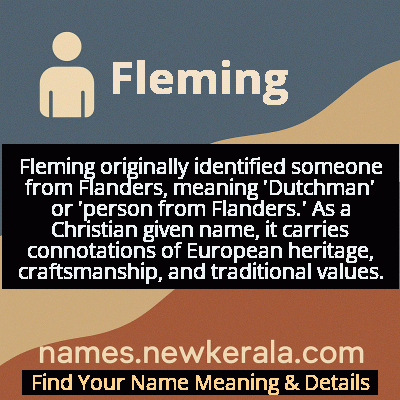Fleming Name Meaning & Details
Origin, Popularity, Numerology Analysis & Name Meaning of Fleming
Discover the origin, meaning, and cultural significance of the name FLEMING. Delve into its historical roots and explore the lasting impact it has had on communities and traditions.
Name
Fleming
Gender
Male
Origin
Christian
Lucky Number
3
Meaning of the Name - Fleming
Fleming originally identified someone from Flanders, meaning 'Dutchman' or 'person from Flanders.' As a Christian given name, it carries connotations of European heritage, craftsmanship, and traditional values.
Fleming - Complete Numerology Analysis
Your Numerology Number
Based on Pythagorean Numerology System
Ruling Planet
Jupiter
Positive Nature
Optimistic, inspirational, and creative.
Negative Traits
Scattered, exaggerating.
Lucky Colours
Yellow, gold, purple.
Lucky Days
Thursday.
Lucky Stones
Yellow sapphire.
Harmony Numbers
1, 2, 9.
Best Suited Professions
Arts, writing, communication.
What People Like About You
Creativity, optimism.
Famous People Named Fleming
Fleming Mackell
Ice Hockey Player
NHL player who won two Stanley Cups with the Toronto Maple Leafs
Fleming H. Revell
Publisher
Founder of Fleming H. Revell Company, prominent Christian publishing house
Fleming Begaye Sr.
Military Veteran
Navajo Code Talker who received Congressional Gold Medal
Name Variations & International Equivalents
Click on blue names to explore their detailed meanings. Gray names with will be available soon.
Cultural & Historical Significance
In Christian contexts, the name Fleming gained additional significance as many Flemish settlers were devout Christians who brought their faith traditions with them. The transition from surname to given name occurred particularly in English-speaking Christian communities, where it came to represent not just geographical origin but also values of hard work, integrity, and faithfulness. The name's association with the Protestant work ethic and Christian values made it appealing to families seeking names that reflected both heritage and religious commitment, creating a dual cultural identity that bridges ethnic roots with spiritual values.
Extended Personality Analysis
People named Fleming typically exhibit a distinctive blend of practicality and creativity, reflecting the historical Flemish reputation for both commercial acumen and artistic excellence. They often demonstrate meticulous attention to detail and a methodical approach to tasks, characteristics that serve them well in professional and personal endeavors. Flemings are generally perceived as reliable and trustworthy individuals who value consistency and follow-through on commitments. Their problem-solving abilities tend to be both innovative and grounded, allowing them to develop practical solutions to complex challenges.
Socially, Flemings often possess diplomatic skills and cultural awareness, enabling them to navigate diverse social situations with ease. They typically show respect for tradition while remaining open to new ideas, creating a balanced perspective that others find appealing. Many display quiet confidence rather than overt assertiveness, with leadership qualities that emerge naturally rather than being forced. Their resilience in facing adversity often surprises others, as they tend to handle challenges with composed determination. The combination of these traits typically results in individuals who are respected for their integrity, valued for their reliability, and appreciated for their ability to bridge different perspectives.
Modern Usage & Popularity
In contemporary naming practices, Fleming remains a relatively uncommon but respected choice, primarily used in English-speaking countries by parents seeking distinctive names with historical depth. Its usage has maintained a consistent but low profile over recent decades, never reaching mass popularity but enjoying steady selection by families valuing European heritage and traditional sounds. The name appears more frequently in regions with historical Flemish connections or among families with Dutch ancestry, though it has transcended its ethnic origins to become a general given name choice. Modern usage often reflects educated, middle-to-upper-class families who prefer names that are recognizable yet uncommon, offering both individuality and traditional resonance. While not trending significantly upward or downward, Fleming maintains its position as a sophisticated alternative to more common traditional names, appealing particularly to parents who appreciate its blend of European heritage and Christian associations.
Symbolic & Spiritual Meanings
Symbolically, Fleming represents the enduring power of cultural identity and the marriage of tradition with innovation. The name evokes the historical Flemish mastery of both commerce and art, symbolizing the ability to balance practical concerns with creative expression. It carries connotations of craftsmanship and attention to detail, suggesting a person who approaches life with both skill and care. Metaphorically, Fleming represents cultural bridge-building—the capacity to maintain one's own identity while engaging productively with diverse perspectives and traditions.
The name also symbolizes resilience and adaptation, reflecting how Flemish culture preserved its distinct character through centuries of political and social change. It suggests a person who honors roots while embracing progress, who values heritage without being constrained by it. In a broader sense, Fleming represents the European tradition of regional identities contributing to larger cultural tapestries, making it symbolic of both particularity and universality—the idea that strong individual or cultural identities can enrich rather than divide the human community.

